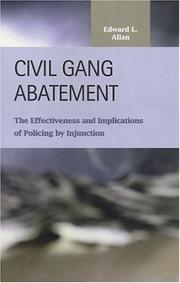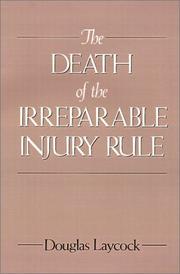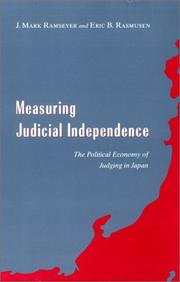| Listing 1 - 10 of 11 | << page >> |
Sort by
|
Book
Year: 2017 Publisher: [Place of publication not identified] : Great Neck Publishing,
Abstract | Keywords | Export | Availability | Bookmark
 Loading...
Loading...Choose an application
- Reference Manager
- EndNote
- RefWorks (Direct export to RefWorks)

ISBN: 1280361379 9786610361373 1593321031 9781593321031 9781593320416 1593320418 9781280361371 6610361371 Year: 2004 Publisher: New York LFB Scholarly Pub.
Abstract | Keywords | Export | Availability | Bookmark
 Loading...
Loading...Choose an application
- Reference Manager
- EndNote
- RefWorks (Direct export to RefWorks)
Gangs --- Organized crime --- Injunctions --- Nuisances --- Adjoining landowners --- Self-help (Law) --- Torts --- Law and legislation
Book
ISBN: 1108891101 1108835619 1108875777 1108880762 Year: 2022 Publisher: Cambridge, United Kingdom ; New York, NY : Cambridge University Press,
Abstract | Keywords | Export | Availability | Bookmark
 Loading...
Loading...Choose an application
- Reference Manager
- EndNote
- RefWorks (Direct export to RefWorks)
Patents are important tools for innovation policy. They incentivize the creation and dissemination of new technical solutions and help to disclose their working to the public in exchange for limited exclusivity. Injunctions are important tools of their enforcement. Much has been written about different aspects of the patent system, but the issue of injunctions is largely neglected in the comparative legal literature. This book explains how the drafting, tailoring and enforcement of injunctions in patent law works in several leading jurisdictions: Europe, the United States, Canada, and Israel. The chapters provide in-depth explanation of how and why national judges provide for or reject flexibility and tailoring of injunctive relief. With its transatlantic and intra- European comparisons, as well as a policy and theoretical synthesis, this is the most comprehensive overview available for practicing attorneys and scholars in patent law. This book is also available as Open Access on Cambridge Core.
Patent suits. --- Injunctions. --- Patent laws and legislation --- Patent litigation --- Actions and defenses --- Civil procedure --- Constitutional law --- Equitable remedies --- Extraordinary remedies --- Provisional remedies --- Interdict (Civil law) --- Anti-injunction law --- patent injunctions --- innovation --- technology --- law and technology

ISBN: 1280524839 0195362519 9780195362510 9781280524837 0195063562 9780195063561 0197718876 Year: 1991 Publisher: New York, N.Y. Oxford University Press
Abstract | Keywords | Export | Availability | Bookmark
 Loading...
Loading...Choose an application
- Reference Manager
- EndNote
- RefWorks (Direct export to RefWorks)
Drawing on an analysis of numerous cases, the author argues that the "irreparable injury" rule is defunct, since it no longer constrains a court's choice of remedy. He proposes new injury rules based on actual practice.
Equitable remedies --- Equity --- Injunctions --- Remedies (Law) --- Specific performance --- Performance, Specific --- Contracts --- Performance (Law) --- Tort and negligence --- United States --- United States of America --- Specific performances
Book
ISBN: 1283274736 9460944299 9786613274731 9789460944291 9781283274739 Year: 2010 Publisher: The Hague Eleven International Publishing
Abstract | Keywords | Export | Availability | Bookmark
 Loading...
Loading...Choose an application
- Reference Manager
- EndNote
- RefWorks (Direct export to RefWorks)
Anti-suit injunctions are orders restraining a party from commencing or continuing proceedings before a state court and can be issued by a court or arbitral tribunal. This book examines if and when anti-suit injunctions can be ordered, and it contemplates their legal conformity. It deals with jurisdictions familiar with anti-suit injunctions (e.g. England and the US) and compares these with the legal setting in Switzerland. The analysis not only relies on publicly available material, but also on confidential arbitral case law. Besides information on arbitral proceedings reported directly by ar
International commercial arbitration. --- Injunctions. --- International commercial arbitration --- Arbitration and award, International --- Commercial arbitration, International --- International arbitration and award --- Arbitration and award --- Conflict of laws --- Anti-injunction law --- Actions and defenses --- Civil procedure --- Constitutional law --- Equitable remedies --- Extraordinary remedies --- Provisional remedies --- Interdict (Civil law) --- Law and legislation
Book

Year: 2015 Publisher: Jan Sramek Verlag
Abstract | Keywords | Export | Availability | Bookmark
 Loading...
Loading...Choose an application
- Reference Manager
- EndNote
- RefWorks (Direct export to RefWorks)
The starting point for this project on the »Basic Questions of Tort Law« was the book written by Helmut Koziol, the »Basic Questions of Tort Law from a Germanic Perspective« (Sramek Verlag, 2012), a volume which presented an introduction into the law of torts from a Germanic perspective. Colleagues from seven countries were then invited to give critical responses to the ideas presented in the 2012 volume. The comparative law conclusions then attempt to pick up on the ideas expressed in the legal systems examined and to make them amenable for debate on the further development of the legal systems and their harmonisation.
Torts --- Tort law, damages, contract law, comparative law, unjust enrichment, criminal law, insurance law, social security law, injunctions, economic analysis, prescription, basic questions, aims of tort law. --- Schadenersatzrecht, Vertragsrecht, Rechtsvergleichung, Bereicherungsrecht, Strafrecht, Versicherungsrecht, Sozialversicherungsrecht, einstweilige Verfügungen, ökonomische Analysen, Verjährung, Grundfragen, Prinzipien des Schadenersatzrechts
Book
Year: 2021 Publisher: Basel, Switzerland MDPI - Multidisciplinary Digital Publishing Institute
Abstract | Keywords | Export | Availability | Bookmark
 Loading...
Loading...Choose an application
- Reference Manager
- EndNote
- RefWorks (Direct export to RefWorks)
Conflict, including the threat or fear of potential violence, or being witness to or a victim of physical violence, constantly surrounds gangs and their communities and is the principal driver sustaining gang life. This Special Issue examines the diverse nature of gang-related violence with the goal of better understanding the growing complexities of gang violence over the last two decades to better inform public policy solutions. The contributions included in this Special Issue highlight the complex nature of gang-related violence in the 21st Century. As much as policy makers, the media, and even scholars like to simplify gang-related violence, all of the studies included in this Special Issue highlight the nuance and variation that exists.
street gangs --- public health --- Good Lives Model --- intervention --- prevention --- gang --- violence --- incident reports --- police data --- drug markets --- gangs --- opioids --- overdose --- spatial concentration --- generalized cross-entropy --- street gang violence --- civil gang injunctions --- conflict network --- social network analysis --- social networks --- crisis --- organized crime --- homicide --- retaliation --- gang homicide --- comparative research --- ethnography --- gang violence --- desistance --- network composition --- criminal behavior --- homicide types --- disaggregation --- latent class analysis --- shootings --- social media --- focused deterrence --- n/a
Book
ISBN: 3319943480 3319943499 Year: 2018 Publisher: Cham : Springer International Publishing : Imprint: Springer,
Abstract | Keywords | Export | Availability | Bookmark
 Loading...
Loading...Choose an application
- Reference Manager
- EndNote
- RefWorks (Direct export to RefWorks)
This book compares the law on provisional measures of common law and civil law countries, the goal being to identify and compare their main advantages and disadvantages. The guiding concept is a well-known statement by the Justices of the US Supreme Court expressed in the famous Grupo Mexicano case, according to which the “age of slow-moving capital and comparatively immobile wealth” has now passed, and the 21st century requires a fresh look at the law of provisional measures. In the quest to find a model for interim relief, the Mareva Injunction, subsequently renamed the ‘Freezing Order’ in the English Civil Procedural Rules, is used as the benchmark to which each of the targeted systems discussed here is compared. This is because international scholarship, as well as e.g. the US Supreme Court, generally consider the Mareva Injunction to be the most effective and farthest-reaching provisional remedy. The analysis suggests that the Mareva Injunction / Freezing Order represents the type of relief that will most likely continue to dominate as the most efficient and farthest-reaching interim measure in the years to come.
Injunctions --- Interlocutory decisions --- Debtor and creditor --- Interlocutory decrees --- Interlocutory judgments --- Interlocutory orders --- Judgments --- Commercial law. --- Private International Law, International & Foreign Law, Comparative Law . --- Business Law. --- European Law. --- International Economic Law, Trade Law. --- Business --- Business law --- Commerce --- Law, Commercial --- Mercantile law --- Law --- Law merchant --- Maritime law --- Law and legislation --- Private international law. --- Conflict of laws. --- Law—Europe. --- International law. --- Trade. --- Law of nations --- Nations, Law of --- Public international law --- Choice of law --- Conflict of laws --- Intermunicipal law --- International law, Private --- International private law --- Private international law --- Legal polycentricity --- Civil law --- Comparative law. --- Trade regulation. --- Private International Law, International and Foreign Law, Comparative Law. --- Regulation of trade --- Regulatory reform --- Trade regulation --- Commercial law --- Consumer protection --- Deregulation --- Comparative jurisprudence --- Comparative legislation --- Jurisprudence, Comparative --- Law, Comparative --- Legislation, Comparative --- Europe.

ISBN: 1282537695 9786612537691 0226703878 9780226703879 9780226703886 0226703886 9781282537699 6612537698 Year: 2003 Publisher: Chicago University of Chicago Press
Abstract | Keywords | Export | Availability | Bookmark
 Loading...
Loading...Choose an application
- Reference Manager
- EndNote
- RefWorks (Direct export to RefWorks)
The role of the U.S. Supreme Court in the aftermath of the 2000 presidential election raised questions in the minds of many Americans about the relationships between judges and political influence; the following years saw equally heated debates over the appropriate role of political ideology in selecting federal judges. Legal scholars have always debated these questions-asking, in effect, how much judicial systems operate on merit and principle and how much they are shaped by politics. The Japanese Constitution, like many others, requires that all judges be "independent in the exercise of their conscience and bound only by this Constitution and its laws." Consistent with this requirement, Japanese courts have long enjoyed a reputation for vigilant independence-an idea challenged only occasionally, and most often anecdotally. But in this book, J. Mark Ramseyer and Eric B. Rasmusen use the latest statistical techniques to examine whether that reputation always holds up to scrutiny-whether, and to what extent, the careers of lower court judges can be manipulated to political advantage. On the basis of careful econometric analysis of career data for hundreds of judges, Ramseyer and Rasmusen find that Japanese politics do influence judicial careers, discreetly and indirectly: judges who decide politically charged cases in ways favored by the ruling party enjoy better careers after their decisions than might otherwise be expected, while dissenting judges are more likely to find their careers hampered by assignments to less desirable positions. Ramseyer and Rasmusen's sophisticated yet accessible analysis has much to offer anyone interested in either judicial independence or the application of econometric techniques in the social sciences.
Judges --- Judicial process --- Political questions and judicial power --- Courts --- Judicial activism --- Judicial power and political questions --- Act of state --- Administrative discretion --- Judicial review --- Jurisdiction --- Law --- Rule of law --- Separation of powers --- Decision making, Judicial --- Judicial behavior --- Judicial decision making --- Procedure (Law) --- Political aspects --- Psychological aspects --- Interpretation and construction --- J4700.90 --- J4701 --- J4709 --- J4710 --- J4712 --- Japan: Law and jurisprudence -- history -- postwar Shōwa (1945- ), Heisei period (1989- ), contemporary --- Japan: Law and jurisprudence -- policy, legislation, guidelines, codes of behavior --- Japan: Law and jurisprudence -- theory, methodology and philosophy --- Japan: Law and jurisprudence -- judicial organization and procedures --- Japan: Law and jurisprudence -- judicial organization and procedures -- court and trials --- supreme court, legal system, judiciary, political influence, politics, selection, federal judges, merit, principle, japan, japanese constitution, communism, ideology, criminal, government, justice, taxpayers, constitutional law, injunctions, malapportionment, military, elections, protest, activism, free speech, nonfiction, judicial process, power, courts, decision making.
Book
ISBN: 1479857629 Year: 2020 Publisher: New York : New York University Press,
Abstract | Keywords | Export | Availability | Bookmark
 Loading...
Loading...Choose an application
- Reference Manager
- EndNote
- RefWorks (Direct export to RefWorks)
Considers how research in psychology offers new perspectives on property law, and suggests avenues of reform Property law governs the acquisition, use and transfer of resources. It resolves competing claims to property, provides legal rules for transactions, affords protection to property from interference by the state, and determines remedies for injury to property rights. In seeking to accomplish these goals, the law of property is concerned with human cognition and behavior. How do we allocate property, both initially and over time, and what factors determine the perceived fairness of those distributions? What social and psychological forces underlie determinations that certain uses of property are reasonable? What remedies do property owners prefer? The Psychology of Property Law explains how assumptions about human judgement, decision-making and behavior have shaped different property rules and examines to what extent these assumptions are supported by the research. Employing key findings from psychology, the book considers whether property law’s goals could be achieved more successfully with different rules. In addition, the book highlights property laws and conflicts that offer productive areas for further behaviorally-informed research. The book critically addresses several topics from property law for which psychology has a great deal to contribute. These include ownership and possession, legal protections for residential and personal property, takings of property by the state, redistribution through property law, real estate transactions, discrimination in housing and land use, and remedies for injury to property.
Possessiveness. --- Property --- Acquisition of property. --- Things (Law) --- Possession (Law) --- Right of property. --- Property. --- Psychological aspects. --- Discrimination. --- Fair Housing Act. --- Lockean labor theory. --- Ownership. --- Possession. --- Preferences. --- Prejudice. --- Remedies. --- Schemas. --- Stereotype. --- Taxes. --- adaptation. --- adverse possession. --- anchoring. --- applied psychology. --- bailments. --- bankruptcy exemptions. --- behavioral law and economics. --- bounded rationality. --- bundle of rights. --- cognitive biases. --- cultural differences. --- debiasing. --- deception. --- dictator game. --- disparate impact. --- dual agency. --- eminent domain. --- endowment effect. --- expropriation. --- externalities. --- fair housing. --- family property. --- first possession. --- groupthink. --- homelessness. --- homes. --- homestead exemptions. --- identifiability effect. --- identity. --- implicit bias. --- in-kind redress. --- inequity aversion. --- injunctions. --- just compensation. --- legitimacy. --- liability rules. --- long-term tenants. --- mere ownership effect. --- monetary compensation. --- motivated reasoning. --- neighborhood associations. --- nudges. --- omission bias. --- optimism bias. --- overoptimism. --- ownership. --- participatory democracy. --- personal property. --- personhood theory. --- property rights. --- property rules. --- psychology-informed property law. --- quick take. --- redistribution. --- remedies. --- reparcellation. --- resource theory. --- self- help. --- self-serving bias. --- social norms. --- source dependence. --- sunk costs. --- takings. --- tenancy by the entirety. --- theories of private property. --- trespass. --- ultimatum game. --- undercompensation. --- well-being.
| Listing 1 - 10 of 11 | << page >> |
Sort by
|

 Search
Search Feedback
Feedback About UniCat
About UniCat  Help
Help News
News